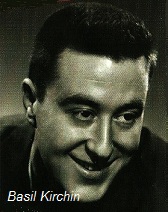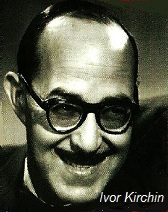










          |
| Basil Kirchin... |
 |
|
|
 Basil Kirchin first started playing the drums in December 1941 at The
Paramount, Tottenham Court Road, London, where his father Ivor had the
resident band. In those days life as a civilian was not an easy one, the
family having to spend every night in the underground tube station as the
German blitz raged overhead. The work schedule also was a demanding one
commencing at 3 p.m. every afternoon and carrying on until 5.45 p.m.
Then, after a quick meal, the band would return to The Paramount to play
from 7 p.m. until 11.45 p.m. The band worked 14 sessions per week other
than every alternate Monday night, which was the only time that they had
off. Basil was so consumed with music, however, that even on his night
off he would usually join in with the relief band, in order to broaden his
very youthful experience.
Basil Kirchin first started playing the drums in December 1941 at The
Paramount, Tottenham Court Road, London, where his father Ivor had the
resident band. In those days life as a civilian was not an easy one, the
family having to spend every night in the underground tube station as the
German blitz raged overhead. The work schedule also was a demanding one
commencing at 3 p.m. every afternoon and carrying on until 5.45 p.m.
Then, after a quick meal, the band would return to The Paramount to play
from 7 p.m. until 11.45 p.m. The band worked 14 sessions per week other
than every alternate Monday night, which was the only time that they had
off. Basil was so consumed with music, however, that even on his night
off he would usually join in with the relief band, in order to broaden his
very youthful experience.Eventually, the war came to an end, and, having enjoyed (in the true sense) a baptism of fire, Basil was ready to take his place in the wider world of music. After five years, to their great credit, his parents realised that it would be in the best long term interests of their son to let him accept one of the many offers that had been coming in, which he did, joining a newly formed band called Harry Roy and His New 1946 Orchestra. This was literally the first of the "big bands" and Basil was featured as a solo drummer. Harry Roy had his own night club, the renowned "Milroy" and was also under contract to produce seven broadcasts every fortnight for the BBC. During the period of his membership with the Roy Band Basil learned to play every kind of music in jobs ranging from theatre tours to concerts, dances, night clubs, jazz clubs and hundreds of hours spent in broadcasting and recording studios. By the end of the 1940's he had joined the Ted Heath Band, at that time the most highly regarded in Europe, and several continental tours followed. Mike Senn: I was on lead alto in one of the first bands that Basil led, (without Ivor) in the early fifties. We went to a residency at the Ritz, Manchester. Although we had rehearsed, the band was rough, and I am reliably informed that Mr. Binks (the demon manager) phoned Mecca headquarters and got us the sack the first night. We lasted a month, at the end of which Binks had the grace to say that if the band had sounded at the start as it did at the end, he would not have complained. It is hard to remember the guys, or their names after all this time. But in the trumpets were Ronnie Baker (not the alto player) and Paul Berman. Johnny Weed was on piano. The tenors were Roy Sidwell and Gray Allard. We had some tenor leads (Four Brothers style) played by Roy and Gray. I got some flak from musicians in Manchester for having a "funny tone" on alto, the Four Brothers sound apparently not having reached there then. The next time I played with the Kirchin band was at the Royal Tottenham; this was with Basil and Ivor. The personnel included Harry South on piano. Trumpets were Stan Palmer, Trevor Lannigan, Tony Grant. Saxes: Me, Roy Sidwell, John Xerri & Lennie Dawes on baritone. A bit later they went on the road, and enjoyed their greatest success. I had left and the lead alto during this time was Brian Haden. It is interesting to note that one reason for the band's success was the ban on jiving. In dance halls then, you were only allowed to jive during Latin American sets. Basil solved this by playing a lot of LA sets, to the kids' delight. The Kirchin band, co-led and directed by his father Ivor, originated when Basil took their London-based band up to Edinburgh for a residency at the Fountainbridge Palais, beginning there on September 8th, 1952. The band made several broadcasts from Fountainbridge with the following line-up: Tony Grant, Stan Palmer, Bobby Orr, Norman Baron, trumpets; Ronnie Baker, Duncan Lamont, Pete Warner, John Xerri, Alex Leslie, saxes; Harry South, piano, Ronnie Seabrook, bass, Basil Kirchin, drums, Johnny Grant, vocals, John Clarke, arranger, Ivor Kirchin, leader. The Fountainbridge was followed in November 1953 by an engagement at the Plaza Ballroom in Belfast, Northern Ireland, which lasted until March of the following year. During this period the band recorded a thirteen week commercial radio series with the singer Ruby Murray for Radio Luxembourg. Near the end of the engagement in Belfast Bobby Orr left with embouchure problems, switched to drums and became one of the finest drummers in the country. After a string of appearances at various ballrooms the band took up summer residence at the Royal, Tottenham. There Jimmy Paxton and Buddy Featherstonhaugh joined for a short time on alto and baritone, to be replaced later by Mike Senn and Roy Sidwell.
|
 Ron Simmonds: Basil was a great drummer, one of the best, and I enjoyed
playing with the band, mostly on record dates and TV shows. It was a
demanding book, especially exciting for trumpets. Occasionally either
Bobby Pratt or myself would get booked to play on Ivor’s broadcasts or
record sessions. On the records Bobby went by the pseudonym of Big Tarp,
because he was under contract to Ted Heath at the time.
Ron Simmonds: Basil was a great drummer, one of the best, and I enjoyed
playing with the band, mostly on record dates and TV shows. It was a
demanding book, especially exciting for trumpets. Occasionally either
Bobby Pratt or myself would get booked to play on Ivor’s broadcasts or
record sessions. On the records Bobby went by the pseudonym of Big Tarp,
because he was under contract to Ted Heath at the time.Shortly after this Ivor Kirchin was involved in a serious car accident and asked Basil to take over the leadership of the band whilst he was in hospital. This engendered a desire in Basil to have his own band. However in practice Basil found his first band, although small in number, extremely difficult to deal with, due to having to handle the day to day business management and at the same time continue to write his own music, which, being original, required many hours of rehearsal. This, together with Ivor Kirchin's return to fitness, resulted in the birth of a new idea — the creation of a jointly led big band to be fronted by Ivor, who would also manage all the business side, leaving Basil free to play the drums and utilise his creative energy in creating the music and perfecting its performance. The new line up consisted of four trumpets, four saxophones and three rhythm — literally everything about the concept was new and it caught on very rapidly. At the end of the first year, for instance, the band had broken attendance records wherever it played, and after only ten months in existence was voted the fourth best band in the Melody Maker poll. In the following year two major record companies were bidding for the Kirchin Band, Decca, and EMI's Parlophone label under George Martin. The band made four singles and an EP for Decca and a further two singles for Parlophone with whom they eventually signed, as they were allowed considerably more musical control by George Martin. A substantial amount of recording took place between 1951 and 1957 under both their own name, and several other splinter groups. Outside of the music business the band had acquired a number of illustrious fans, including Sean Connery, Jose Ferrer, Rosemary Clooney, William Bendix, Dana Andrews, Elizabeth Taylor and her then husband the late Mike Todd. The band were also extremely popular at this time with the general public and played their first Poll Winners Concert to a standing ovation. Billy Eckstine and Sarah Vaughan would only tour England if the band’s agent, Harold Davison, promised that they could have the Kirchin Band to accompany them. One point that should be mentioned here is that Basil and Ivor were the first band to take their own P.A. system around with them. This meant that Basil, who was obsessive about recording everything the band did, even rehearsals, could get very good recordings, as his tape recorder was plugged direct into their P.A. system. Because of this the following Billy Eckstine eulogy was actually on tape, recorded at the last show of a concert tour in Bradford's Alhambra Theatre Billy Eckstine: "As most of you know, I once had a band of my own with Charlie Parker and Dizzy Gillespie, amongst others whose names may be known to you, but, I must tell you that I have been standing in the wings for every single show this week without missing one of their spots, and never in my life have I heard such a band. It is very difficult for me to believe that they are not American let alone that they are not coloured — ladies and gentlemen please, your applause for what I sincerely believe to be one of the great bands in the world today, to be ranked alongside Duke, Count and Dizzy — I give you the Kirchin Band." Another tour de force occurred at the band's fourth Poll Winners Concert which again took place at the Albert Hall following their rendition of a 12 minute version of the jazz classic "Sing Sing Sing". The end of the piece brought the entire Albert Hall audience to its feet in spontaneous applause and it was only with some difficulty that the stage manager and promoters were able to persuade an excited audience that an encore was out of the question because other bands were waiting to follow in their wake. Having by now gained acceptance on an international basis, Basil found he was trapped within the image of wild uninhibited music, this in spite of the fact that over 40% of his output was not the wild stuff, but beautiful orchestral tones and colours woven into music. Also he was burning to write more "expanded" music. There was only one way to do it—he disbanded the band in spite of the furore that caused and the next years were spent around the world.... Musicians and records...xxxxxxxDance halls & the BBC...
|
| ||